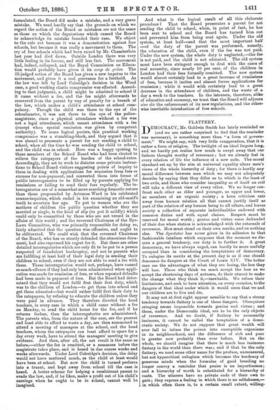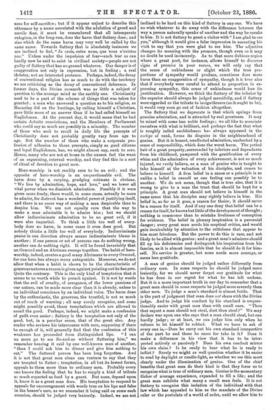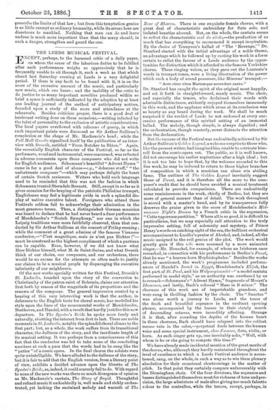FLATTERY.
DEMOCRACY, Mr. Goldwin Smith has lately reminded ns (and we are rather surprised to find that the reminder was necessary), is something more than " a form of govern- ment." We might say, with very little exaggeration, that it is rather a form of religion. The twilight of an ideal lingers long, and we hardly yet realise how much is swept away that our fathers thought worthy of reverence ; but we already feel in every relation of life the influence of a new code. The moral standard set up by the aim at universal equality alters men's views of the whole hierarchy of duty ; for there is hardly any moral difference between men which we may not adequately describe by saying that they differ as to which is the least of two evils, and those who consider inequality as of itself an evil will take a different view of every other. We no longer con- front each other as elder and younger, as upper and lower, as members of an organic society ; a keen criticism eats away from human relation all that cannot justify itself as part of the relation of any human being to all others, and leaves society a collection of separate individualities endowed with common duties and with equal claims. Respect must be reserved for moral worth ; genius and virtue seem defrauded of their due when station is acknowledged with the externals of reverence. Men must stand on their own merits, and on nothing else. The Spectator has never given in its adhesion to that fashionable fatalism which supposes that the moment we dis- cern a general tendency, our duty is to further it. A great democracy, we have always urged, can hardly be more usefully occupied than in considering the temptations of democracy. To eulogise its merits at the present day is as if one should denounce its dangers at the Court of Louis XIV. The better men see the advantages of what they are losing, the less they will lose. Those who think we must accept the loss aa we accept the shortening days of autumn, do their utmost to make the change what they think it,—inevitable. We refuse their limitations, and seek to turn attention, on every occasion, to the dangers of that ideal under which it would seem that we and our children are to live and die.
It may not at first sight appear sensible to say that a strong tendency towards flattery is one of these dangers. Obsequious cringing seems impossible towards genius and virtue ; and these, under the Democratic ideal, are to be the only objects
of reverence. And no doubt, if flattery be necessarily insincere, it cannot be called the temptation of a demo- cratic society. We do not suppose that great wealth will ever fail to infuse the poison into susceptible organisms in its neighbourhood, and the difference of rich and poor is greater now probably than ever before. But on the whole, we should imagine that there is much less insincere flattery in the world than there was ; and if that be the only flattery, we need some other name for the profuse, unmeasured, but not hypocritical eulogium which becomes the tendency of generous minds when the formulas of good breeding no longer convey a reminder that praise is an impertinence; and a hierarchy of worth is substituted for a hierarchy of caste. The ntterers have no private ends of their own to gain ; they express a feeling in which there is no selfishness,— in which often there is, to a certain small extent, willing.
ness for self-sacrifice ; but if it appear unjust to describe this utterance by a name associated with the adulation of greed and servile fear, it must be remembered that all intemperate enlogium, in the long-run, does the harm that flattery does ; and sins which do the same harm may very well be called by the same name. Towards flattery that is absolutely insincere we are inclined to feel, " Je crois, entre nous, quo vous n'existez pas." Unless under the impulsion of fear—such fear as can hardly now be said to exist in civilised society—people are not guilty of flattery that has no ground whatever. Our danger is of exaggeration not only in expression, but in feeling ; a real idolatry, not an interested pretence. Perhaps, indeed, the decay of conventional religion has as much to do with the tendency we are criticising as the decay of conventional deference. In former days, the Divine monarch was as little a subject of question to the average mind as the earthly one. Christianity used to be a part of the scheme of things that was taken for granted ; a man who answered a question as to his religion, as Macaulay did on the hustings, by calling himself a Christian, gave little more of an answer than if he had called himself an Englishman. At the present day, it would mean that he had certain definite convictions, and the Members of Parliament who could say as much are possibly in a minority. The number of those who seek to recall in daily life the precepts of Christianity does not probably greatly vary from age to age. But the number of those who make a corporate pro- fession of adhesion to those precepts, simply as good citizens and loyal Englishmen, has, we might almost say, sunk to zero. Hence, many who are not at home in the unseen feel the want of an organising, external worship, and they find this in a sort of ritual of devotion to great men.
Hero-worship is not readily seen to be an evil ; and the opposite of hero-worship is an unquestionable evil. The harm done by a carping, grudging estimate is obvious. " We live by admiration, hope, and love," and we lower all vital power when we diminish admiration. Possibly if it were given more freely, there would, in some cases, actually be more to admire, for distrust has a wonderful power of justifying itself, and there is no surer way of making a man despicable than to despise him. We are not equally sure that the way to make a man admirable is to admire him ; but we should allow indiscriminate admiration to be no great evil, if it were also impartial. To think a little too well of every- body does no harm, in some cases it even does good. But nobody thinks a little too well of everybody. Indiscriminate praise in one direction always means indiscriminate blame in another ; if one person or set of persons can do nothing wrong, another can do nothing right. It will be found invariably that an Ormuzd and an Ahriman emerge together. The habit of hero- worship, indeed, creates a good many Ahrimans to every Ormuzd, for one hero has always many antagonists. Moreover, we do not allow that when a habit is shown to be the characteristic of generous natures a reason is given against pointing out its dangers. Quite the contrary. This is the only kind of temptation that it seems to us worth while to preach against. It is not by words that the evil of cruelty, of arrogance, of the lower passions of our nature, can be made more clear than it is already, unless to an individual conscience by an individual voice. The harm done by the enthusiastic, the generous, the trustful, is not so much out of reach of warning ; all may surely recognise, and some might possibly avoid, those temptations which are allowed to assail the good. Perhaps, indeed, we might make a confession of guilt even easier ; flattery is the temptation not only of the good, but, in a peculiar sense, that of the great also. Any reader who reviews his intercourse with men, supposing if there be enough of it, will generally find that the confession of this weakness has proceeded from distinguished lips. "I can no more go to see So-and-so without flattering him," we remember hearing it said by one well-known man of another, "than I could ask him to dinner and give him nothing to eat." The flattered person has been long forgotten. And it is not that great men alone can venture to say that they are tempted to flatter ; temptation, in all but its lowest forms, appeals to them more than to ordinary men. Probably every one knows the feeling that he has to supply a kind of tribute as much expected as food by a guest. But none, depend upon it, know it as a great man does. His temptation to respond to appeals for encouragement with words true on his lips and false in the hearer's ears, as we remember it being said on some such occasion, should be judged very leniently. Indeed, we are not
inclined to be hard on this kind of flattery in any one. We have no wish whatever to do away with the difference between the way a person naturally speaks of another and the way he speaks to him. It is not flattery to greet a visitor with " I am glad to see you," although it would give a false impression in narrating his visit to say that you were glad to see him. The adjective changes its meaning with the pronoun, though even so it may no doubt be used insincerely. As to that more dubious region where a great poet, for instance, allows himself to discover signs of promise in poor verses, we will only say that the sense of unkindness or slight which the true pro- portions of sympathy would produce, sometimes does more harm than an exaggeration of sympathy, though it is true also that if everybody were careful to attend to proportion in ex- pressing sympathy, this sense of unkindness would lose its justification. However, we think the flattery of the inferior by the superior should always be judged mercifully, and if flattery were regarded as the tribute to insignificance (as it ought to be), it would very soon go out of fashion altogether.
The flattery that we deprecate is that which springs from genuine admiration, and is attracted by real greatness. It may be mixed with some less noble feelings ; we all like to associate ourselves with what is brilliant, and perhaps the fact that what is roughly called snobbishness has always appeared in the cortege of rank, forms its disguise in the neighbourhood of genius. But it is honest, unaffected admiration, unchecked by a sense of responsibility, which does the worst harm. The petted heir of a great property, surrounded by inferiors and dependants from his childhood, pampered with the gratification of every whim and the admiration of every achievement, is not so much injured, we verily believe, as a man of genius who is taught to take himself at the valuation of his disciples, and conies to believe in himself. A firm belief in a cause or a principle is as unlike a belief in oneself as one feeling can possibly be to another. We do not mean, though that is true also, that it is wrong to give to a man the trust that should be kept for a principle. A great man should not believe in himself in the same sense that his disciples may rightly believe in him. His belief is, as far as it goes, a reason for theirs; it should never be a reason for itself. And if any one deny that belief can be a reason for itself, be knows but little of the development of thought ; nothing is commoner than to mistake liveliness of conception for evidence. The belief in plenary inspiration is a perennial danger; every great man needs his sceptical critics, and would gain incalculably by attention to the criticisms that appear to him most frivolous. But the power to do this is rare, and not likely to be allied with genius ; and a great man's admirers should fill up his deficiencies and distinguish his inspiration from his fancies, as it is almost impossible that he should do it for him. self. No service is greater, but none needs more courage, or earns less gratitude.
A man of genius should be judged rather differently from ordinary men. In some respects he should be judged more leniently, for we should never forget our gratitude for what he has done in our regret for what he has left undone. But it is a more important truth in our day to remember that a great man should in some respects be judged more severely than other men. To judge a man's standard is almost futile. That is the part of judgment that man does not share with the Divine judge. And to judge his conduct by his standard is unques- tionably easier with great men than with small ones. "Thou that sayest a man should not steal, dost thou steal ?" We may declare war upon one who says that a man should steal, but can hardly judge ; or at least, we can judge him only when he refuses to let himself be robbed. What we have to ask of every one is,—Does he carry out his own standard irrespective of the part he and those he cares for take in it ? Does it make a difference in his view that it has to be inter- preted actively or passively P Does his own conduct mirror his own claim P Is he ready to bear what he is ready to inflict ? Surely we might as well question whether it be easier to read by daylight or candle-light, as whether we see this most clearly under the illumination of genius. One of the chief benefits that great men do their kind is that they force us to recognise what is true of ordinary men. Genius is the momentary flicker of average experience, expanded to fill a life ; and the great man exhibits what many a small man feels. It is not flattery to recognise this isolation of the individual with that law which has appealed to him as the mandate of the Divine ruler or the postulate of a world of order, until we allow him to prescribe the limits of that law ; but from this temptation genius is as little exempt as ordinary humanity, while its errors here are disastrous to mankind. Nothing that man can do and leave undone is much more important than that the many should, in such a danger, strengthen and guard the one.




































 Previous page
Previous page